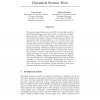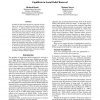59 search results - page 10 / 12 » The individual and the group in console gaming |
ATAL
2009
Springer
14 years 2 months ago
2009
Springer
Certain observable features (tags), shared by a group of similar agents, can be used to signal intentions and can be effectively used to infer unobservable properties. Such infere...
UAI
2004
13 years 9 months ago
2004
We propose dynamical systems trees (DSTs) as a flexible model for describing multiple processes that interact via a hierarchy of aggregating processes. DSTs extend nonlinear dynam...
SYNTHESE
2010
13 years 2 months ago
2010
In studies of multi-agent interaction, especially in game theory, the notion of equilibrium often plays a prominent role. A typical scenario for the belief merging problem is one ...
CANDC
2009
ACM
14 years 2 months ago
2009
ACM
This paper presents preliminary findings from our empirical study of the cognition employed by performers in improvisational theatre. Our study has been conducted in a laboratory ...
EJWCN
2010
13 years 2 months ago
2010
We formulate the problem of distributed throughput-efficient sensing in cognitive radio (CR) networks as a dynamic coalition formation game based on a Markovian model. The propose...



